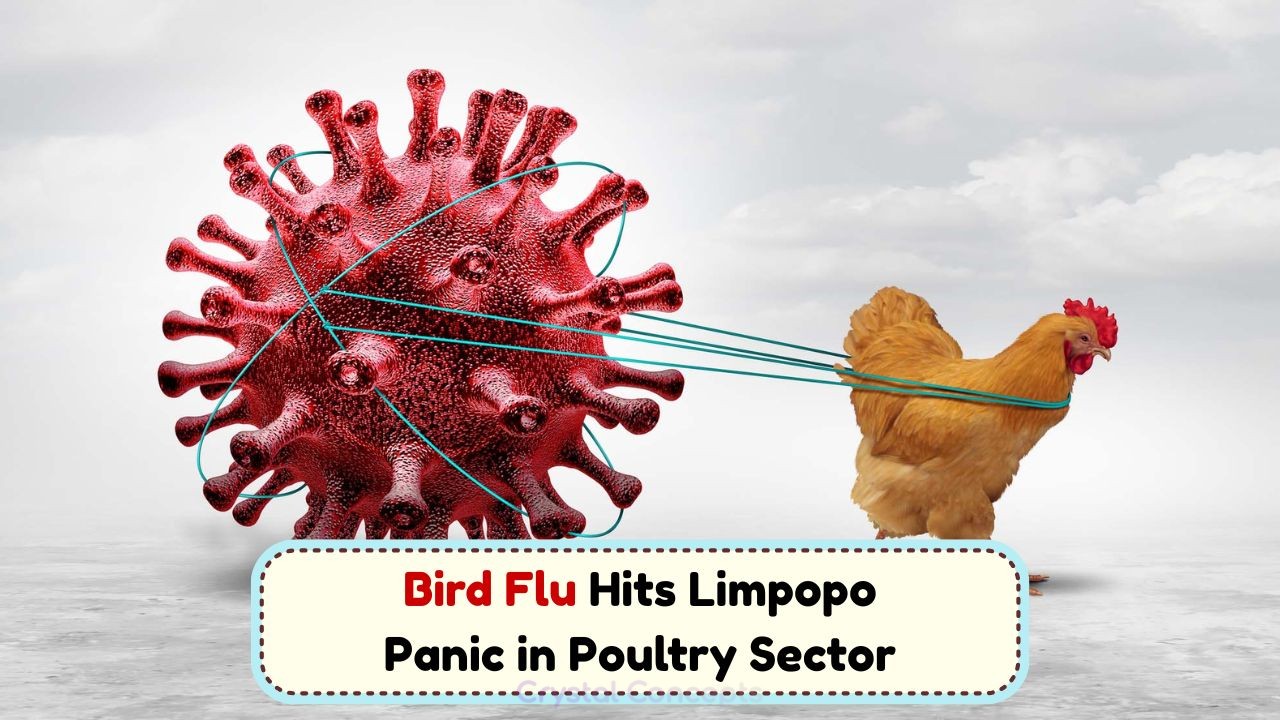Bird Flu Outbreak in Limpopo: The recent outbreak of the deadly bird flu in Limpopo has sent shockwaves across South Africa, raising concerns among consumers about the safety of poultry products. As the flu continues to spread, it poses significant threats not only to the poultry industry but also to public health. This situation has prompted experts to issue urgent warnings as they work tirelessly to contain the virus and prevent a full-blown epidemic. Consumers are advised to stay informed and vigilant as the government implements measures to control the outbreak. It’s crucial to understand the implications of this crisis and the steps being taken to mitigate its impact on our daily lives.
Understanding the Bird Flu Epidemic in South Africa
The bird flu, also known as avian influenza, is a viral infection that primarily affects birds but can also infect humans and other animals. In Limpopo, this outbreak has been identified as the H5N1 strain, which is known for its high mortality rate in birds. The virus spreads through direct contact with infected birds or contaminated surfaces, making it a significant concern for poultry farmers and consumers alike. Authorities are urging people to practice good hygiene and avoid contact with wild birds. The South African government has ramped up surveillance and control measures, including culling infected birds and restricting the movement of poultry in affected areas. These efforts aim to prevent the virus from spreading to other provinces and causing further economic and health impacts.
- Immediate containment is crucial to prevent a wider spread.
- Poultry farms are under stringent monitoring.
- Consumer education on safe poultry handling is ongoing.
- Healthcare facilities are on high alert for potential human cases.
- Import and export regulations are being reviewed.
- Vaccination strategies are being considered.
- Collaboration with international health bodies is underway.
- Public awareness campaigns have been intensified.
Impact on the South African Poultry Industry
The bird flu outbreak in Limpopo has put the South African poultry industry under immense pressure. As one of the largest producers of poultry in Africa, the country faces potential economic losses running into millions. The culling of infected birds means reduced supply, potentially leading to increased prices for consumers. Farmers are grappling with the financial strain of implementing biosecurity measures and dealing with the loss of livestock. The government is working closely with industry stakeholders to provide support and ensure that the supply chain remains as uninterrupted as possible. However, the long-term impact on the industry remains uncertain, with potential risks of job losses and reduced exports on the horizon.
| Year | Poultry Production (tons) | Economic Contribution (billion Rands) | Employment (thousands) |
|---|---|---|---|
| 2021 | 1.4 million | 45 | 120 |
| 2022 | 1.5 million | 47 | 125 |
| 2023 (est.) | 1.2 million | 40 | 115 |
| 2024 (proj.) | 1.3 million | 43 | 118 |
Preventative Measures for Consumers
Consumers play a vital role in preventing the spread of bird flu by adhering to safety guidelines. It’s essential to cook poultry thoroughly, as the heat kills any potential virus present. Avoid purchasing poultry from unverified sources, and always ensure that eggs are properly cooked. Regular handwashing and sanitizing surfaces that come into contact with raw poultry can significantly reduce the risk of infection. The South African Department of Health emphasizes the importance of staying informed through credible news sources and government updates. By taking these precautions, consumers can protect themselves and contribute to the collective effort in managing this outbreak.
- Ensure thorough cooking of all poultry products.
- Purchase poultry from reputable sources only.
- Practice regular hand hygiene after handling raw poultry.
- Avoid contact with wild or stray birds.
- Stay informed about local outbreaks and guidelines.
- Report any unusual bird deaths to authorities.
- Consider vaccination if recommended by health officials.
- Support local farmers by following safe consumption practices.
Government Response to the Bird Flu Crisis
The South African government has mobilized a robust response to the bird flu outbreak, working in tandem with local and international health organizations. A task force has been established to coordinate efforts across different provinces, focusing on containment, prevention, and mitigation strategies. Public health campaigns are being rolled out to educate citizens on the risks and preventative measures. The government is also exploring financial assistance options for affected farmers to help stabilize the poultry industry. Ongoing research is being conducted to better understand the virus and develop effective treatments. These comprehensive measures demonstrate the government’s commitment to safeguarding public health and maintaining food security during this challenging time.
- Formation of a national task force for coordinated response.
- Increased funding for research and development.
- Collaboration with WHO and other international bodies.
- Implementation of stricter biosecurity protocols.
- Financial aid packages for affected poultry farmers.
- Public health information dissemination campaigns.
- Regular updates and communication with the public.
- Exploration of vaccination programs for poultry.
Understanding Bird Flu Symptoms in Humans
While the bird flu primarily affects birds, it can, in rare cases, infect humans. It’s crucial to recognize the symptoms early for prompt medical attention. Common symptoms resemble those of the flu, including fever, cough, sore throat, and muscle aches. In severe cases, it can lead to respiratory distress and pneumonia. If you suspect you have been exposed to the bird flu or exhibit these symptoms, seek medical advice immediately. The South African health authorities are prepared to handle any potential human cases, with protocols in place for testing and treatment. Early detection and treatment are key to preventing complications and ensuring recovery.
- High fever and chills.
- Persistent cough and sore throat.
- Muscle and joint pain.
- Difficulty breathing or shortness of breath.
- Fatigue and weakness.
- Headaches.
How the Bird Flu Affects Domestic Poultry
Domestic poultry are highly susceptible to the bird flu, with the virus spreading rapidly in crowded conditions. Symptoms in birds include sudden death, respiratory distress, and a drop in egg production. Farmers must remain vigilant, regularly monitoring their flocks for any signs of illness. Implementing biosecurity measures, such as isolating new birds and restricting access to poultry areas, can help reduce the risk of an outbreak. The Department of Agriculture advises farmers to report any suspected cases promptly, as early intervention can prevent widespread losses. Maintaining healthy flocks is critical for the sustainability of the poultry industry and the safety of consumers.
- Sudden increase in mortality rates.
- Decreased egg production.
- Nasal discharge and coughing.
- Swelling around the head and neck.
- Changes in appetite and behavior.
- Frequent monitoring and testing are essential.
Long-Term Implications of the Bird Flu in South Africa
The long-term implications of the bird flu outbreak in South Africa are multifaceted, affecting not only the poultry industry but also food security and public health. The economic impact could be significant, with potential job losses and reduced exports. This crisis underscores the need for sustainable agricultural practices and robust disease surveillance systems. It also highlights the importance of international collaboration in managing zoonotic diseases. Moving forward, South Africa must bolster its capacity to respond to such outbreaks, ensuring that both the economy and public health are protected. This includes investing in research, improving infrastructure, and fostering resilience within the agricultural sector.
| Sector | Impact | Response |
|---|---|---|
| Poultry Industry | Production losses | Government support |
| Public Health | Increased vigilance | Health campaigns |
| Economy | Potential job losses | Economic stimulus |
| International Trade | Export reductions | Trade negotiations |
| Agricultural Practices | Need for sustainability | Research investment |
FAQ Section
What is bird flu and how does it spread?
Bird flu is a viral infection that primarily affects birds but can infect humans and other animals. It spreads through direct contact with infected birds or contaminated surfaces.
Are poultry products safe to eat during an outbreak?
Yes, as long as they are cooked properly. High temperatures kill the virus, making cooked poultry safe to consume.
What should I do if I suspect a bird flu infection?
If you exhibit symptoms of bird flu, seek medical attention immediately. Early treatment can prevent complications.
How is the government addressing the bird flu outbreak?
The government has implemented a range of measures, including increased surveillance, culling infected birds, and public health campaigns to control the spread of the virus.
How can I protect my poultry from bird flu?
Implement biosecurity measures such as isolating new birds, restricting access to poultry areas, and monitoring for symptoms to protect your flock.










